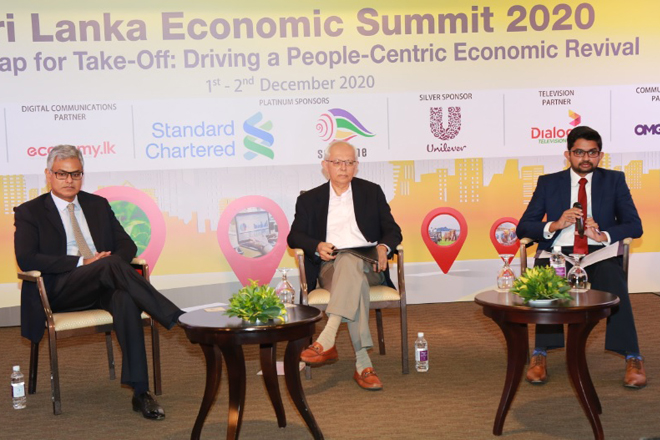Top economists and business leaders discussed the outlook for the global and local economy during the first session of the Sri Lanka Economic Summit 2020 organised by The Ceylon Chamber of Commerce (CCC). Mr Eric Robertsen - Global Head, Research and Chief Strategist, Standard Chartered Bank and Deshamanya Prof W D Lakshman - Governor, Central Bank of Sri Lanka (CBSL) were the two speakers at the session while Deshamanya Mahesh Amalean - Chairman, MAS Holdings and Mr Krishan Balendra - Chairman, John Keells Holdings PLC joined the panel discussion moderated by Mr Shiran Fernando - Chief Economist, CCC.
Despite the impact of the pandemic, Eric highlighted in his speech several positive global developments to take note of. He stated that export levels of emerging markets in Asia had rebounded to pre COVID levels. The recovery in global trade was recorded in two quarters compared to 6-7 quarters in the period post the global financial crisis. Further, he highlighted that a combination of monetary policy support, low level of interest rates and inflation would create a platform for a better economic narrative in 2021.The continuation of a weaker dollar would also be favourable for emerging market assets. Eric stated that according to their research they believe that the recovery of 2021 will look almost like the post war economic recovery with similar economic destruction as a result of the health crisis due to COVID-19.
Central Bank Governor Prof W D Lakshman highlighted that with National Budget 2021 and the policy measures put in place by CBSL and the Government, Sri Lanka possesses the potential to emerge as a stronger and more resilient economy in 2021. The focus was in developing the real sector in reviving industries and expanding business opportunities through encouraging home-grown industries, large as well as Small and Medium Enterprises (SMEs).
Addressing the fiscal and debt concerns the Governor highlighted that high levels of debt could be sustainable when domestic debt was the predominant component in the debt portfolio. He went on to state that the ratio of Government’s foreign non-concessional debt to GDP was around 23 per cent, and the remainder was either domestic debt that can be rolled over or long-term concessional financing. The annual foreign debt service payments as a percentage of export earnings and remittances stood around 12 per cent in ‘business-as-usual’ years such as 2018. The Governor highlight that public debt will be managed in such a way the domestic to foreign component of the debt will adjust from 55:45 in 2020 to 60:40 in 2021. This and the stated policy of not pursuing foreign debt-creating public investments will make government debt more manageable.
In the panel discussion, Mahesh highlighted that exports should be the key element in the roadmap for economic recovery of Sri Lanka. In term of the apparel sector, he highlighted two trends which Sri Lankan businesses must focus on which were that customers were increasingly looking vertically in their sourcing and the rapid growth of digitalisation in the value chain. Krishan highlighted the setback due to COVID-19 for the domestic economy but was optimistic in a rebound during 2021. Citing one example in tourism, he highlighted that their resorts in Maldives has seen higher forward bookings for March-April 2021 compared to previous year’s.
Responding to questions by the participants on the potential for low global interest rates driving capital inflow into markets like Sri Lanka, Eric noted that initially investments would flow to the largest and most liquid markets but could later expand to other diversified investment portfolios with higher risks and returns. In closing Mahesh highlighted three areas for businesses to focus on: operate close to the customer and understand the expectations, understand the capabilities required by companies to operate in this challenging environment and strive for operational excellence in terms of manufacturing competitively and agile.

